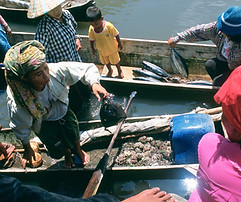Research projects

Modelling and mapping fishing pressure and the current and potential standing stock of coral-reef fishes in the Florida Keys
To assist the process of managing the Florida extending, TFEL are working with TNC and other partners to map coral-reef fisheries. The key aims of this work are to model and map fishing pressure, model and map the current fish standing stock, and assess the potential benefit of conservation and management measures, such as the potential standing stock on a reef following the cessation of fishing. The maps provide important data layers for use in planning conservation initiatives.

Understanding how degraded reef environments affect fish assemblages
We are using a series of aquarium, mesocosm, and field experiments to understand how the characteristics of degraded habitats - such as complexity and olfactory landscapes - select for different traits in fishes and act as drivers of evolutionary change. For example, we are investigating how prey respond to altered predator communities (e.g. increases in meso-predators and the presence of lionfish) in seascapes with reduced habitat complexity.

Assessing interactions between artificial and natural reefs
Funded by FFWCC, we are collaborating with FIU's Predator Ecology & Conservation Lab and the Marine Ecology and Acoustics Lab to examine the effect of the high abundance of predators around Aquarius Reef Base (ARB) on nearby reefs. For example: is the food web of ARB self-sufficient, or does it require a subsidy from surrounding natural reefs? To what extent do ARB predators visit nearby reefs? What proportion of time is spent by predators outside the no-fishing area surrounding ARB? What are the effects of aggregations of predatory fishes on the behavior of herbivores on surrounding reefs (non-consumptive effects)?

Understanding what drives ecological and social outcomes of community-based marine conservation in Indonesia
As part of the Alliance for Conservation Evidence and Sustainability, we are synthesizing data from community-based marine conservation initiatives throughout Indonesia to understand the factors that promote ecological and social success in the region. We are analyzing the short- and long-term impacts of marine protected areas (MPAs) from local to national scales, and investigating the underlying social, governmental, and ecological conditions that drive variation in MPA outcomes. In collaboration with WWF, WCS, Rare, and CI, this work is part of a larger portfolio that aims to more effectively utilize knowledge to foster effective, evidence-based conservation decisions across institutions.
